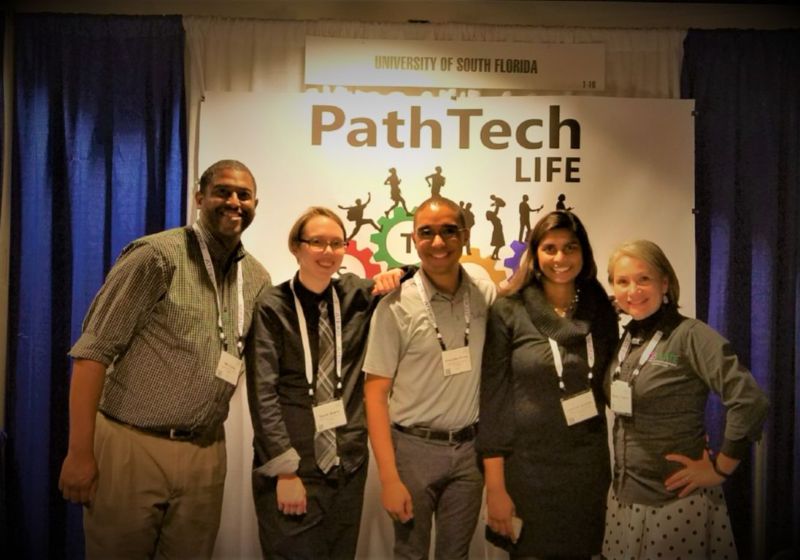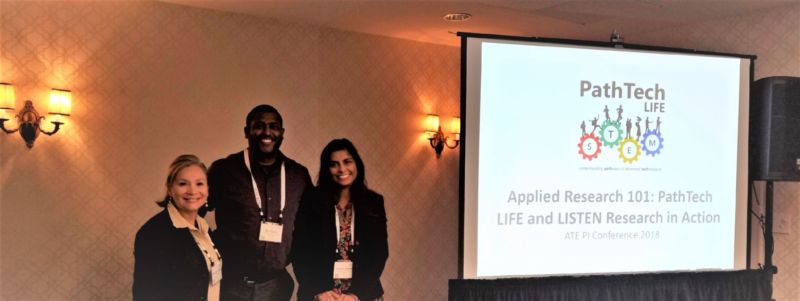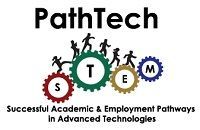Successful Academic and Employment Pathways in Advanced Technologies (DUE #1104214) (PathTech Tampa Bay)
PathTech Tampa Bay examines pathways into high school and community college engineering technology (ET) programs, and to and from the local workforce. PathTech TB completed interviews with 175 unique individuals from high school, community colleges, and industry recruited with help from FLATE.
Interviews were audio recorded, transcribed, and thematically coded. Coding trees were developed based on a priori and emergent themes. Case studies comprehensively described the experiences of the six community college women and profiles of industry companies and employers (Smith 2017). These well-established qualitative methods identified both emergent and saturated themes in the data. The community college student interviewees also completed a short survey with questions about age, marital and caregiving status, educational attainment, funding sources of their ET degree, and parental educational attainment. PathTech TB also utilized national data from the 1997 National Longitudinal Study of Youth (NLSY97) on education and employment pathways. The project team tracked a cohort of 1997 high school graduates through early adulthood by collecting data on their schooling, employment, and personal histories (Fletcher and Tyson 2017).
Publications
Tyson, Will. Teaching and Learning Employability Skills in Career and Technical Education: Industry, Educator, and Student Perspectives. Under contract with Palgrave Macmillan for inclusion in the Palgrave Studies in Urban Education series.
Fletcher, Edward and Will Tyson. 2017. “Bridging Technical Skills Gaps between High School Students and Local Employers.” Journal of Research in Technical Careers 1(1): 20-31.
Fletcher, Edward and Will Tyson. 2017. “A Longitudinal Analysis of Young Adult Pathways to STEMH Occupations.” Career and Technical Education Research 42(1): 35-55.
Smith, Chrystal A. S. 2017. “Community Colleges as a Pathway for Low Income Women to Enter the Engineering Technology Workforce.” Pp. 28-47 in Gender (In)equality: Stalled Revolutions and Shifting Terrains in the 21st Century, edited by Shannon N. Davis, Sarah Winslow, and David J. Maume. Oakland, CA: University of California Press.


PathTech Philosophy
 PathTech aims to conduct targeted research on educational and employment pathways into advanced technology degree programs and careers in conjunction with high schools, community colleges, and industry. As the need for a skilled technology workforce continues to grow, understanding pathways to and from technician education programs and the technology workforce is vital to sustain workforce development, improve student/worker life chances, and stabilize local economies.
PathTech aims to conduct targeted research on educational and employment pathways into advanced technology degree programs and careers in conjunction with high schools, community colleges, and industry. As the need for a skilled technology workforce continues to grow, understanding pathways to and from technician education programs and the technology workforce is vital to sustain workforce development, improve student/worker life chances, and stabilize local economies.
PathTech Overview
PathTech is an ongoing Targeted Research in Technician Education collaboration between researchers at the University of South Florida at the Florida Advanced Technological Education Center (FLATE) at Hillsborough Community College, both in Tampa
PathTech Tampa Bay (2011-15) was a holistic examination of pathways into and out of high school career and technical education career academies, community college advanced technology programs, and manufacturing and high-tech jobs in the Tampa Bay area.
PathTech LIFE (2015-19) is a national survey of students enrolled in community college advanced technology programs. The survey includes data from 3,216 students at 96 colleges in 38 states and 3 US territories.
PathTech LISTEN (2018-21) is longitudinal follow-up interviews with a diverse sample of PathTech LIFE survey participates with the goal of creating a longitudinal survey.
Contact us at [email protected].
Lakshmi Jayaram
Lakshmi Jayaram received her PhD in Sociology from Johns Hopkins University and her Master’s in Public Policy from the University of Chicago.
Dr. Jayaram has 25 years of professional experience, as a professor, researcher, evaluator, consultant, and public policy practitioner, as well as in directing and managing complex projects and collaborative teams. Dr. Jayaram’s expertise spans various substantive areas in education, and she is the Co-Principal Investigator of the NSF-funded longitudinal study, PathTech LISTEN, which examines two-year college students’ enrollment and persistence, under-represented and non-traditional students, and the transition into the technician workforce.
Dr. Jayaram is a specialist in research methodology, has given several invited talks about qualitative research design and fieldwork, has developed and conducted data analysis workshops, and has provided methodological training and mentorship for undergraduate and graduate student research. In addition, Dr. Jayaram co-taught a graduate-level practicum course on mixed methods research and has also taught undergraduate research design and methods classes.
Dr. Jayaram’s education research is based on hundreds of hours of interviews with students, parents, teachers and administrators, as well as classroom observations, focus groups, surveys, social network data, randomized controlled trials, and applied projects. Her publications include peer-reviewed articles and a collaborative book under review, Unequal Contexts: The Pursuit of Social Mobility amid Precarity and Security. Dr. Jayaram is also Co-Investigator of two federally-funded evaluation studies of interventions designed to support family reunification after separation due to substance abuse and child maltreatment. This cross-system work documents and analyzes stakeholder experiences in child welfare, foster care, mental health, and substance abuse recovery systems.
In addition to working in academic settings, Dr. Jayaram was a public policy practitioner for several years, working overseas with Department of Defense Dependents schools, completing rotations within federal government at The White House, U.S. Department of Justice, and the Senate Foreign Relations Committee, as well as internships with the Public Broadcasting Service and the North Central Regional Educational Laboratory.
PathTech Projects
Will Tyson
Dr. Will Tyson is an Associate Professor of Sociology at the University of South Florida. His research examines interpersonal and structural influences on STEM educational and career pathways out of high schools, community colleges, and four-year universities. Dr. Tyson earned his BA in Sociology and Psychology at Wake Forest University and earned his PhD in Sociology at Duke University.
Dr. Tyson has 15 years of experience as an NSF grantee serving in multiple roles on eight different projects totaling $7.9 million, including $2.9 million as a Principal Investigator of PathTech Tampa Bay, LIFE, and LISTEN. He is a co-editor of Becoming an Engineer in Public Universities: Pathways for Women and Minorities. Dr. Tyson is the author of the forthcoming Teaching and Learning Employability Skills in Career and Technical Education: Industry, Educator, and Student Perspectives, under contract with Palgrave Macmillan. This book examines how high school career and technical education (CTE) educators teach and students learn industry-desired employability skills (also called “soft skills”) to prepare students to get a job in a science, technology, engineering, or mathematics (STEM) field and/or attend college right out of high school. These personal and interpersonal skills such as work ethic, problem solving, and teamwork include the cultural capital needed to apply and benefit from academic skills and cognitive ability. These skills are also necessary to be competitive for the estimated 30 million jobs in the United States that do not require a bachelor’s degree yet pay an average of $55,000 a year. His work has been published in Career and Technical Education Research, Educational Researcher, Journal of College Student Retention, Journal of Engineering Education, Journal of Women and Minorities in Sciences and Engineering, Research in Social Stratification and Mobility, among others.
Dr. Tyson has also served on several expert panels and advisory boards related to STEM education research and practice, most recently including the editorial board of Sociology of Education (2011-13, 2017-19) and the National Academy of Engineering (NAE) Committee on Engineering Technology Education (2014-16). Dr. Tyson has experience conducting qualitative, quantitative, mixed methods, and applied research projects through NSF. His projects attempt to combine each facet of research in order to inform multiple stakeholders.
PathTech LISTEN: Mixed Methods Longitudinal Investigations of Students in Technician EducatioN (DUE #1801163)
PathTech LISTEN is a partnership between the Florida Advanced Technological Education Center (FLATE) at Hillsborough Community College (HCC) and sociologists from the University of South Florida (USF) to track student post-enrollment short-term outcomes and understand how programs facilitate technician education experiences and transition into the workforce.
LISTEN accomplishes this goal through three activities: (1) The USF research team will conduct two stages of in-depth interviews with a national sample of former advanced technology students; (2) The USF team will conclude the three-year project by designing and constructing a follow-up longitudinal survey of former students based on knowledge gained from the two stages of interviews; (3) FLATE/HCC will compile a report on recruitment, retention, career counseling, job placement, and student tracking practices employed by advanced technology programs funded by ATE or affiliated with ATE Centers. This mixed methods approach will allow respondents to reflect on their past technician education experiences, current work and schooling situation, and describe their aspirations and goals. By including programs, this study gains institutional knowledge of pathways and efforts to influence and track post-enrollment student outcomes.
This study makes three specific empirical contributions. First, this study will illuminate pathways into technician education and student school-work-life balance concerns to yield information programs can use to increase recruitment, retention, and completion of certificate and AS/AAS programs. Second, this study will help broaden scholarship from a STEM pipeline model to a reality-driven model that accounts for the complex, often cyclical, work-school-work transitions and overlaps students experience. Third, this study will use access to survey data from several underrepresented groups, including women, immigrants, veterans, and individuals with disabilities to tell the stories of the diversification of the technician workforce of the future. By interviewing people across different demographic/life experience groups, we hope to identify patterns among different groups (demographic and life experience groups) in order to help programs address student needs and track student outcomes post-program. We seek to meet this goal by addressing the following questions:
PathTech LIFE: Constructing a National Survey of Engineering Technology Students through Regional and Statewide Testing (DUE #1501999)
PathTech LIFE is an ongoing national study of learning, interests, family, and employment (LIFE) experiences impacting advanced technology student decisions to enroll, return for further coursework, and/or pursue a certificate or AS/AAS degree at two-year colleges. The PathTech LIFE survey was developed with the help of an expert panel of ATE Center PIs and staff in 2015-16 and administered from 2017-18. This project produced a national database of 3,216 students with unprecedented information about students’ academic backgrounds, college experiences, employment background, employment status, motivation for enrollment, program evaluation, academic goals, career goals, and demographic backgrounds. The study seeks to address the following central research questions:
PathTech LIFE Findings Report - All PathTech LIFE Respondents